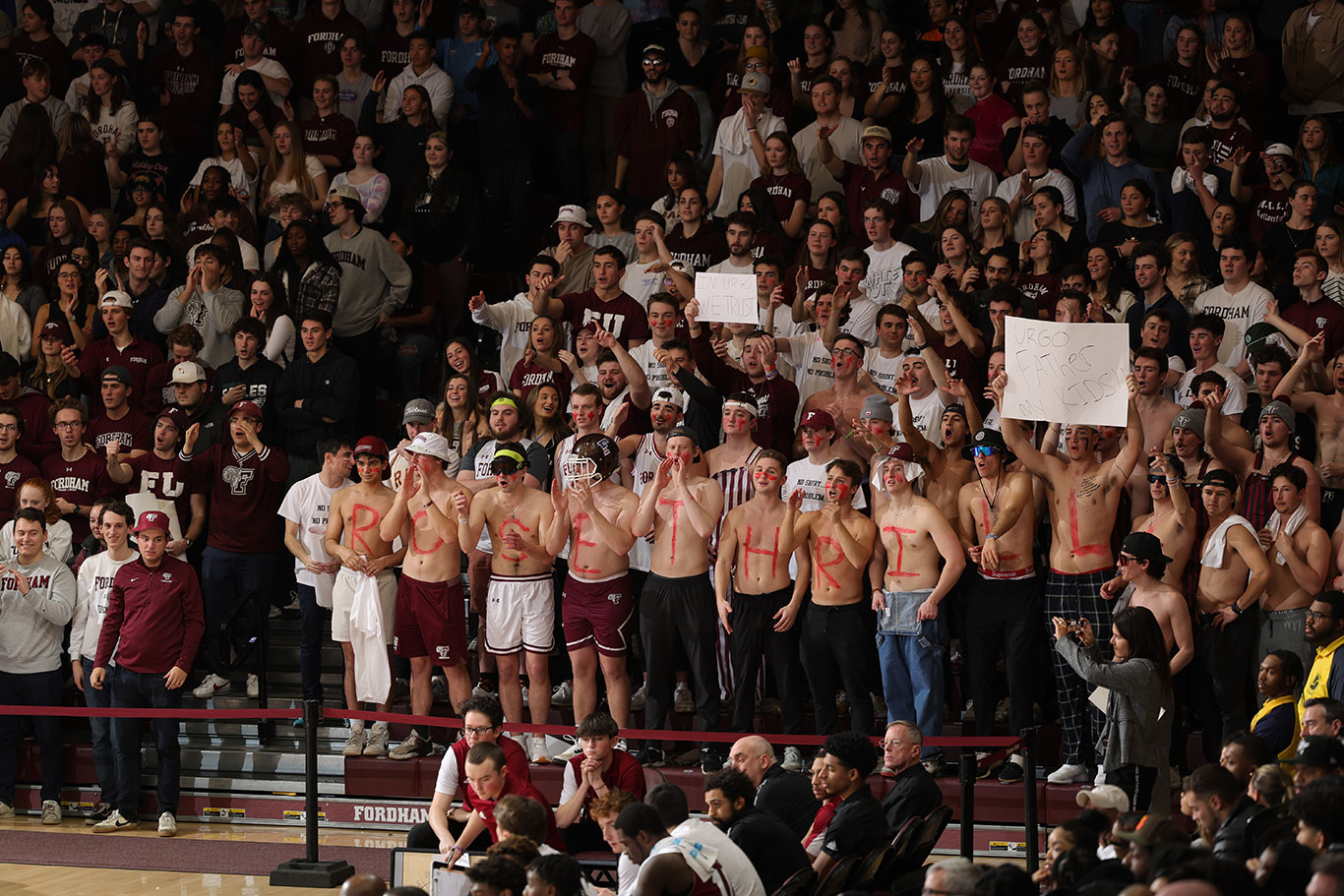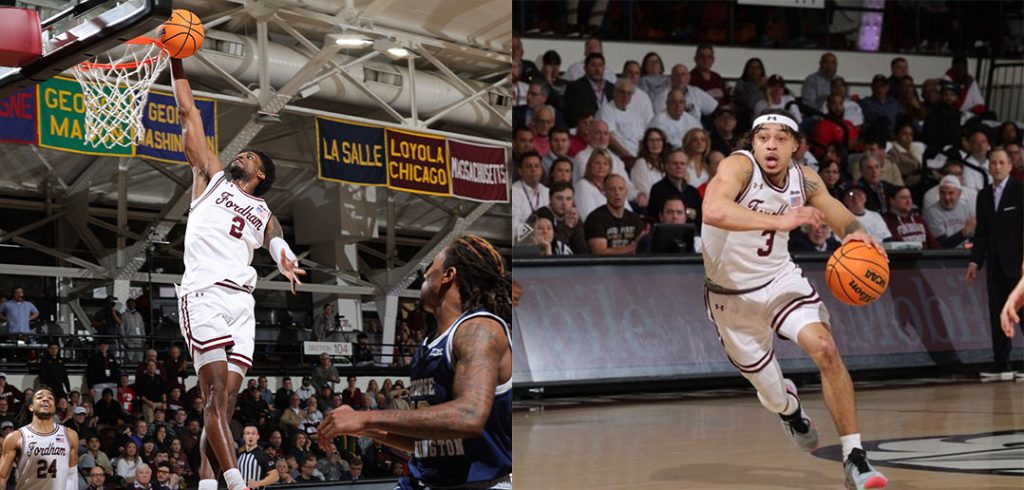Darius Quisenberry and Khalid Moore’s last shot at college glory brought Fordham one of the most electrifying basketball seasons in recent history.
In 2021 and 2022, the star basketball players took advantage of an extra year of playing eligibility they’d earned due to COVID to transfer to Fordham from Youngstown State and Georgia Tech respectively.
A Historic Run
They helped power the Rams to their best season in over 30 years; the team finished with a 25-8 overall record, including playoff games. The team tied for the second-best record in the Atlantic 10 conference, (12-6), and its 24 regular-season wins fueled speculation in the media of a March Madness appearance. The Rose Hill Gym sold out the last six games of the season, and the atmosphere led players to dub it “Rose Thrill.”
Loyalty to a Coach Pays Off
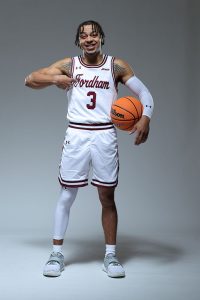
Quisenberry, who completed his undergraduate degree in three years and had two years of eligibility at Fordham, said the difference between last year and this year was day and night.
“We were ranked 11th in the preseason this year, but we believed in ourselves from the beginning. We knew what we were capable of,” he said.
The stats bore it out. Quisenberry reached double figures 28 times in 32 chances, and in twelve games, he scored 20 points. In those games, Fordham went 11-1. He fell just 39 points shy of eclipsing the 1,000-point mark in just two years with the Rams.
The success resonated in a special way because he was recruited in 2021 by Kyle Neptune, who left Fordham after a year to coach at Villanova University.
Quisenberry had established a solid relationship with Urgo, who was then assistant coach. So when Urgo was promoted to head coach in 2022, he knew he’d finish his college career at Rose Hill. He graduated with an M.S. in Media Management on Monday and hopes to play professionally.
A NYC Homecoming
For Moore, joining the Rams was a return to his roots. He grew up in Elmont, New York, and attended Archbishop Malloy High School in Queens.
Unlike Quisenberry, he was brand new to the team this year. When Coach Urgo reached out to him, he jumped at the chance to play his final year of eligibility in the Big Apple.
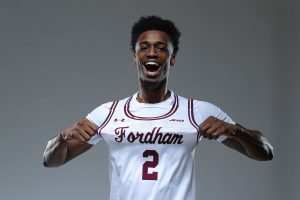
“I was trying to find a situation for me that I felt was the best fit for both athletics and academics. When I came home to visit, I felt like it was definitely a great opportunity for me,” he said.
“From day one, I felt like they welcomed me to be a part of the family.”
Moore finished second on the squad in scoring, with an average of 15.7 points per game, for a total of 519. He ranked second on the team in both field goal percentage (48.6%) and 3-point field goal percentage (35.1%) while connecting on 77.1% of his free throws.
Like Quisenberry, he earned an M.S. in Media Management, which he hopes to use to land a job in the field when playing for a professional team is no longer feasible.
“Towards the end of the year, the atmosphere in the Rose Hill gym was like one like no other,” he said.
“It’s definitely not something I imagined coming out of high school. I feel like everything just comes around full circle.”
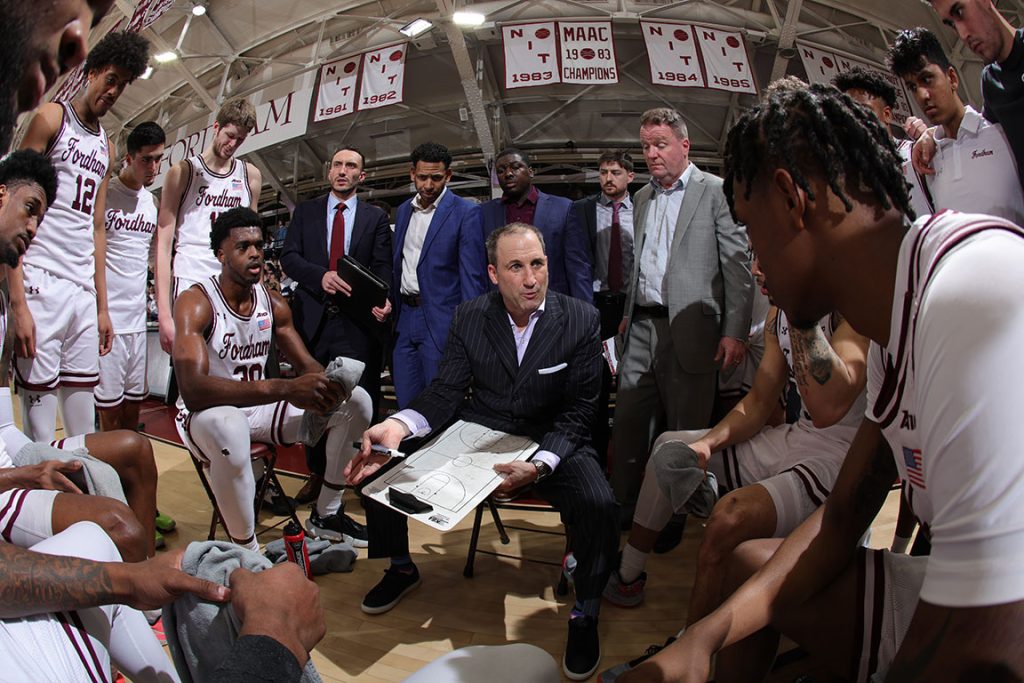
On March 11, the team played in a taut, competitive semi-finals game in front of 10,000 fans at the Barclays Center against the University of Dayton. It was only the second time the team had advanced to the semi-finals since joining the A-10 in 1995 and the first time since 2006. The Rams lost 78-68, but the season, the first with Keith Urgo as head coach, was still regarded as a huge success.
Both players earned accolades: The Metropolitan Basketball Writers Association awarded Quisenberry a spot on the All-Met First Team while Moore earned a place on the All-Met Second Team. The National Association of Basketball Coaches also honored Moore, as well as Urgo, who they named District 4 Coach of the Year. All three, along with Kyle Rose, a junior at the School of Professional and Continuing Studies, were honored by the Atlantic 10 conference, with Urgo being named their coach of the year.
Success That Will Carry On
Urgo said Quisenberry and Moore were key to this year’s success, and he expects the lessons they shared with younger players will carry on in the years to come.
“Khalid’s work ethic was second to none. We hit lightning in a bottle adding him to our program,” he said.
Quisenberry, he noted, was a natural leader who earned the respect of younger players.
“He decided in his final year that all he cared about was winning. He could care less about his numbers. He was going to do whatever it took to win,” he said.
“They’re two dynamic players, but more importantly, they’re dynamic people and leaders, and that’s more important than their actual talent on the floor.”
